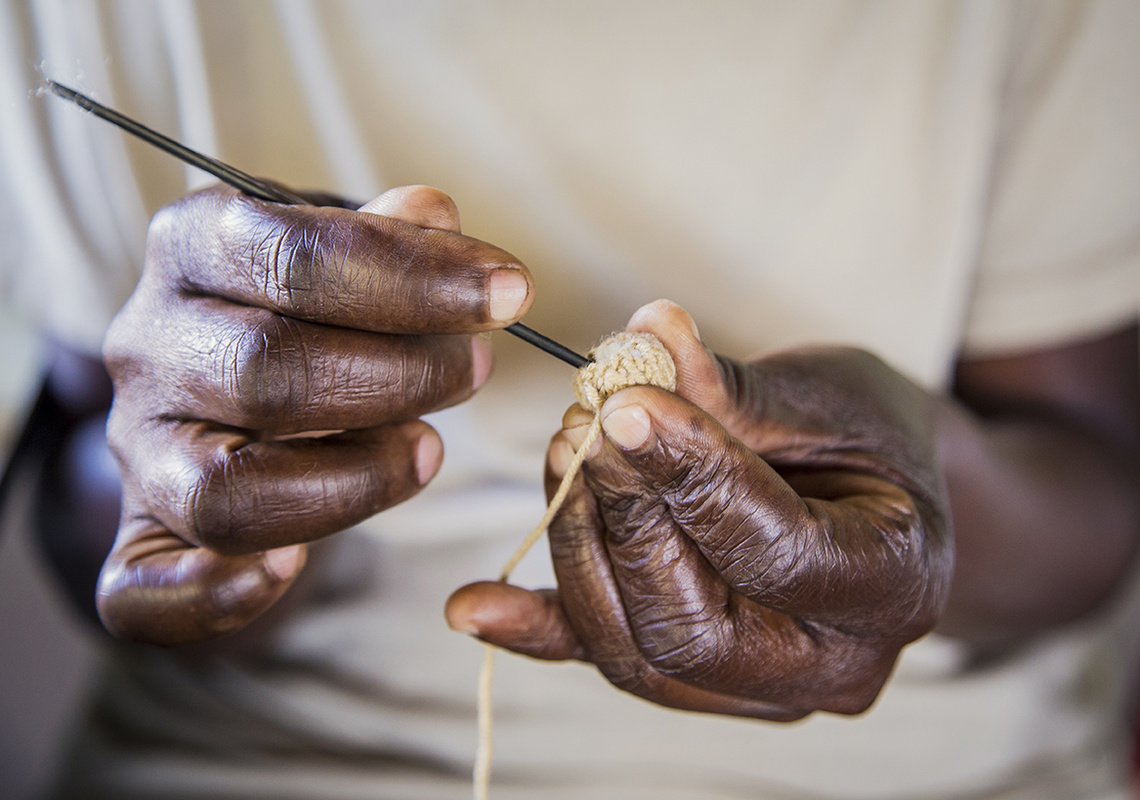Gogo Olive
Knitting for Hope
Gogo Olive, an organization from Mutare, Zimbabwe, teaches us that the gift of a skill can be the gift of hope – the most powerful gift of all.
Words & Images by Mana Meadows
“Knit – it brings hope and joy,” reads the sign hanging in the Gogo Olive headquarters, a modest workshop in Zimbabwe’s eastern city of Mutare. For the Gogo Olive women who make up the Gogo Olive family, this little sign sums it up. In a country choked with unemployment, the organisation allows these women a rare opportunity for self-sufficiency – offering them fair income in exchange for their skills, and also allowing them the freedom to work for themselves. Most of the women here are ex-prisoners, the organisation teaches them to knit whilst they are in prison, employing them too so that they are able to provide for their families even while awaiting or serving sentences. By the time they are released, they have a livelihood, a plan, and most importantly, an incredible support network to help them reintegrate back into society.
The women knit a range of woollen African animals, the endearing animals are 100 % handcrafted and have made a name for themselves in both local and foreign markets – with big names like the UK’s John Lewis amongst those signing up for the eco-friendly, fair-traded authentic African animal characters.
Gertrude Matiza lost her home in 2005 during operation Murambatsvina. After being homeless for two months and living on a sports field, she was forced to move back to her rural area. In 2008 she moved back to Mutare and in 2009 she joined Gogo Olive. Since then life has changed a lot for Gertrude, she has even been able to buy her own house where she lives with her husband Thomas and their daughters Martha and Cynthia. “Gogo Olive has allowed me to protect my life and protect my two girls. I’ve been able to make a living.”
Alice Museve and her daughter Mercy Manyeruke support seven people between them. Eight people live in Alice’s tiny two-roomed house with her. Alice was one of the “original Gogo Olive ladies” – joining in November 2008 when the organization was first formed. Her husband left her a long time ago and Mercy is a widow. If life is hard now for the mother and daughter, and it’s hard to imagine it has been harder. “My husband died in 2008, and I was trying to sell vegetables and tomatoes to pay for school fees. I joined Gogo Olive in 2009. Now I am happy to I can support my children, pay their school fees and buy us all food and clothes.”
We all need a guardian angel at some point in our lives. If becoming a widow and subsequently the sole provider for six children wasn’t enough of a trial, Peacemore Machiri thought she wouldn’t survive it when she became gravely ill with tuberculosis in 2014. With six dependents and high hospital bills she couldn’t make ends meet and was about to be sent home to die. The Gogo Olive Trust in Scotland helped cover her medical expenses and though her recovery has been slow, she is gaining strength every day and is now back on her feet and in a position where she can support her children.
In the midst of Zimbabwe’s economic and social meltdown in 2008, Miriam Mahuku, widowed with three children found herself in a desperate situation trying to provide for her family. She felt she had no option but to go to Zimbabwe’s infamous Marange diamond fields. She was caught by the police and ended up in Mutare Remand Prison. She thought her life was over but made it through prison, and was taught to knit while there. She now supports her family through her work, and sends her children to school. Standards are high at Gogo Olive and the women have to pass strict quality control tests. Aside from the obvious financial benefits of the work, their work also provides them with a source of pride – they are able to provide for their families and their products end up all over the world. This amazes and inspires the women. “When I see the quality of our products I think about my children and I want to learn more! I want God to bless my hands!”
.
Aside from bringing hope and financial security to women, many of whom were in their darkest hours before joining, being part of Gogo Olive brings with it the balm of belonging. Powerful friendships are formed and a sense of community extends far beyond the workshop walls. Best friends Rosa Chakwawa and Laizah Nyatwa have become like family to each other. They met in prison and even moved in together when they didn’t have a home after they were released in Zimbabwe’s Presidential Pardon of February 2013. Since joining Gogo Olive in prison in 2009 they have been through some harrowing times – Rosa’s husband committed soon after she came out of prison and she had a stillborn baby soon after. They now live three doors down from each other.
.

